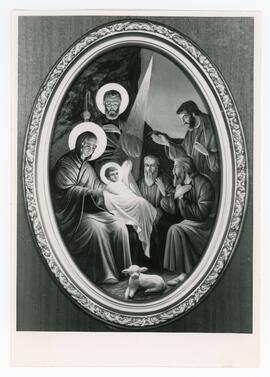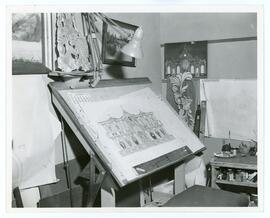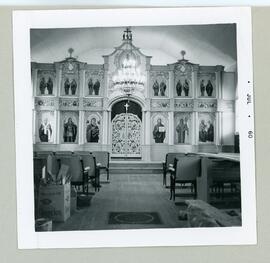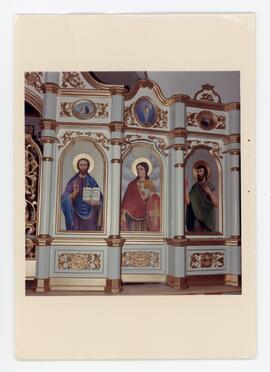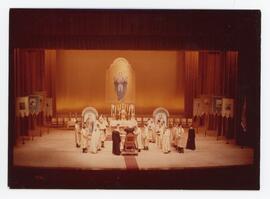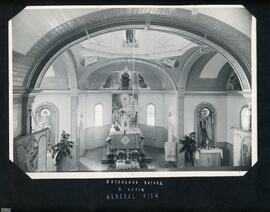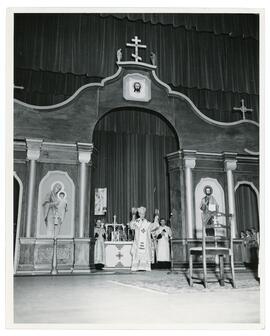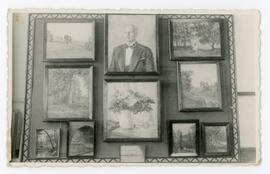This item contains a recording of Avenir Nizoff and George Ivanenko talking about the Harbin immigrants. They discuss different groups of people coming from Harbin starting in 1924. They discuss religion, wars, politics, language, and ethnicity, in relation to these people.
Nizoff, AvenirThis item contains a recording of a meeting. Items discussed included: course offerings and attracting students. Ukrainian course + one suitable for the Women’s Studies. With funding, a specialist in Siberia from Calgary could come and teach - Department of Northern Affairs might be interested in it. Also discussed a need for establishing the Standing and Ad Hoc Committee. Financial and Budget Committee doing space allocation and money allocation – under the jurisdiction of the Head of
the Department. Discussing equipment matters.
This item contains minutes from a CEESSA Meeting. Topics discussed include:
Writing thanks to Hungarian Association for a very successful evening of cultural exchanges
Letter written to Prime-Minister [Pierre] Trudeau sent on November 10
Mr. Kulak is leaving for Ottawa, writing a letter to him
Correspondence: from the Minister RE. application for the grant of CEESSA that was approved – writing a reply of thanks and appreciation.
CEESSA Heritage Project
Several application to the government were sent. One was okayed, another was about to be reviewed as a priority one. Hope to hear from Monroe soon.
A letter from editor of Heritage Magazine – news about conference of CEESSA
A letter with a check for membership from Volikovsky (?)
A letter from President of McGuiness Distillery in Toronto RE donation of liquor and wine for conference
Conference letters from Sr. Williams proposing a panel discussion
Don Massey group
Professor Wojciechowski’s letter
Financial Committees report: bank loan for $1500; $3090 of donations; $600 coming. Things pending: salary + money for Christmas
Special account for conferences. Good financial standing
Publicity committee report: goal to get more members from ethnic groups of CEESSA, Canadians at large. Contacting press: Heritage Magazine, St. John Magazine. TV interviews. Priestly and Kostash work on how to organize that. Lectures on the CKUA radio about Eastern Europe.
Alberta Teachers Association contact and liaison – Mrs Lobay will have a meeting with them in January. Visiting schools with lectures about Eastern European problems. Materials to teach.
School grades 5 and 8 – information about immigrants in Canada, so schools need information to teach about roots and such.
Could there be a special Educational Committee? Recommendation for Kostash
Possibly an Ad-Hoc Committee on Education.
To which degree CEESSA supports only University activities rather than broader community’s – consulting the Constitution. Discrepancy between Constitution and the Green Pamphlet.
A sourcebook for teaching at high schools (who were the immigrants, when they came, where they settled, etc.) – not enough information
CEESSA bulletin could serve as a book review source – who and how will do that?
Curriculum: 12 units on Canadian content at $3000 each. Teachers are expected to do that on their own time, so nothing is done. Ukrainian language is dropped at high schools but Spanish gets promoted because of the immigrants from Chili. Promoting CEESSA through all possible means. January 27 – General Meeting. January 31 – Board Meeting.
This item is a recording from Banff conference of CEESSA
(Session #18): Chairman is [Andre] Tari
Only 2 sessions were allocated for the community topic
Mrs. Pelech talking about Sunday school
[Czartoryski?] talking about cultural heritage
Duska speaking about educational needs
Dudaravicius talking about identity
Dudaravicious’ presentation: identity as subjective sense of belonging in groups. Canadian identity is multiculturalism. Forcing immigrants to conform to the Anglo-Saxon or French identities., to forget their mother tongue and dances.
Mrs. Pelech: Saturday schools get grants. They are needed to preserve cultural group’s true history and provide information about it. Participants of those schools need pride and motivation. There are people-parasites who are not interested in anything except pleasures. Regular school and Saturday one compliment each other and does not compete. They teach respect to ethno-cultural heritage and be proud of it; they motivate youth for a healthy life outlook. Media and parents do not anymore encourage to learn. Edmonton school board is cooperative. Recommendation for the UofA to prepare teachers for language classes, especially in native languages. Languages should be compulsory at the university level.
Mr. Duska: Teaching our young people respect for their cultural heritage will help them respect other Canadians. We should keep children busy learning and off the streets. There is no single program at Canadian universities for Hungarian studies. Provincial governments refused to help. There was a suggestion to establish an endowment fund. Hungarians campaign to promote own language/culture at a university level.
Mr. [Czartoryski?], Executive Director of CEESSA, talking about maintaining cultural heritage. Academics, people with higher education have an obligation to go back to the communities and help with higher level of education. Academics are often accused by the community members. 30% of Alberta population are of East European background. Canadian schools struggle to develop in their students certain values.
Session 2:
Panelists: Dr. Chandler; Don [Benge] from Saskatchewan, Director of the Curriculum of the Edmonton Public School Board; Don Massey; Arthur Levin; Dean Lock; Mrs. Lobay
Dr. Chandler: Department of Education develops programs but does not build the books, about ethnic groups in particular. CEESSA’s objectives and the Department of Education’s objective can coincide and they can help each other with regards to the materials that are down to the level of the elementary children. The nature of multicultural education is beneficial and enriching for everyone. Opportunities in the curriculum for ethnic studies: good balance between Canadian studies and global studies, studies of the past and contemporary studies. Curriculum becomes more compulsory if certain goals are specifically identified. Tentative outline: grade 1 program about family should look at families of different ethnic backgrounds; grade 2 – groups that influence you. Should include what children should learn about various ethnic groups; grade 3 – communities; should take a look at communities with different ethnic cultures within Canada; grade 5 – Canada as a whole, should look at immigration and settlement in Canada; grade 7 – study of cultures in general, should look at native people in Canada and their relationship to the multicultural nature of Canada; grade 8 – study of developing nations in the World, should look at immigration policy of Canada; grade 10 – study of Canadian economic and political problems, should look at how multiculturalism adds to national unity. A Committee set up to develop materials for the program, and CEESSA should contact the Committee.
A motion to form a National Society
This item is a recording of the Annual General Meeting of CEESSA.
Electing the President, Vice-President, Treasurer and Secretary
Describing the functions of each position
Not holding any office for more than 2 years
Nomination for President: Mrs. Lobay – accepted the nomination
Nomination for Vice-President: Dr. Metro Galutsan – accepted the nomination
Nomination for Treasurer: Mr. Dudaravicius – accepted the nomination
Nomination for Secretary: Dr. Bela Biro – accepted the nomination, appointed by acclamation
Mr. Kostash – would rather go to the educational committee
Mr. Kuester – appointed to the publicity committee
The finance committee – Algis Dudaravicius
Nominating Chairman: Mr. Kostash
Nominating Committee: Mr. Spillios, Mr. [Yerevic], Mr. [?]
Mr. Priesley and Mr. Kostash will appoint their own respective committees
The Nominating Committee had to be appointed today in case of some emergency
May 3, 7:30 – next meeting
Meeting adjourned
Side B- a lesson in the Russian Language (exercise in translation)
This item is an audio file containing the very last moment of Mr. Schmid's address, applause , and Mr. Agust Osis- his common prayer concludes the conference of CEESSA of 1977.
Tape opens with some joking about Jews and Germans in Canada. A question is asked about where to find guidance about the Eastern European Germans living in Canada. The speaker [presumably Dr. Bergin from the previous tape] responds that it’s easier to find guidance for East Germans than it is for West Germans post WWII. Questioner responds that there’s plenty of information about German immigrants to other parts of the world, but not Alberta. Speaker responds that they must make like a detective and find things.
A questioner asks about the social cohesion of German Canadians. Speaker discusses that there are many issues that exist, particularly the disconnect between the scholarly world and the communities (jokes about the ‘civilized’ manner of scholars and how it doesn’t mesh well for example if the scholar cannot stand Beer Halls). Discusses the difficulties brought about by a national guilt complex following the two World Wars, making it difficult for academically trained Germans to go out into the communities.
A new speaker points out the lack of courses that seem to deal with Hungary in the Division of Eastern European and Soviet Studies Courses. [The tape cuts off to a new speaker]
Mention about the United States stance on Taiwan. Discussion about joint Soviet-American action on China. Mention of the high possibility that world conquest still on the minds of the Soviet Union. Debate as to whether or not the Soviet Union still adheres to the idea of World Revolution and Global Communism. Discussion about the difference between European Communist and Soviet Communist models. Debate as to whether the rise of European Communist Parties in European governments would increase the power of the Soviet Union or not. Discuss whether or not the Soviets would strongarm their way to influence Yugoslavia. More discussion about whether or not Yugoslavia may enter the Soviet sphere. It is mentioned that the Soviet Imperialist approach is far more realistic than the other Imperialist approaches of other powers. The Western powers lack the will of resistance to oppose every act of Soviet opposition in the world. Example of China as a failure of the United States to oppose the spread of Communist influence due to a lack of will. Discussion of the ideological differences between Euro Communism and how the Soviets wouldn’t approve of an undermining of their control. Question of Soviet involvement in Quebec separatism, responding with the notion that the Soviet Union supports multinational states ‘sticking together’. Example of PQ support for Ukraine independence annoying Soviet officials.
Importance of protesting Russian violations of the Helsinki pact.
Presentation by Dr. Sukoversky: the definition of a collection, and that professors start collections. Students can start collections too. Ethnic groups can start collections.
Continuation of presentation by Dr. Sukoversky: Continues talking about how collections are made. Story about how a collection that had been abandoned was resurrected. Talks about the Sorbian people living in South East Germany, and how a collection was made about the Sorbs. University of Alberta has the strongest collection of materials on Sorbs and Vends. Collections must go back as far as possible. Collections can morph from one topic into another: Russian to Ukrainian, Ukrainian to Polish, Polish to Czech, Czech to Yugoslavia. Talks about the weak Slovak and Hungarian collection. To non-Slavs, Hungarian is expected. Importance of objective study of the Soviets, teachers and students can get an objective lens on the Soviet Union.
New speaker: The community has supported many cultural programs.
Presentation by the Chairman of Edmonton Historical Board: Begs the division to do things for the community: research into the history of ethnic groups needed. Role of ethnic groups missing from history books. Record of ethnic peoples needed. Record must include when people came to Edmonton and district, who were they, what did they do? Those who came to the urban areas, what did they do? An accurate, non-biased, non-prejudiced record needed. Coordination of research needed. Books are needed that are easy to sell and easy to buy. The third need is for funding to publish existing nearly finished works on ethnic groups.
Mr. Kostash: Funds are public funds for publishing, justification must be given as to why financial support should be given to many works. What liaison exists in terms of public funds and works that wish to be published?
Dr. Sukoversky: The University Library exists for a variety of purposes. To expand the library, tax payers would need to pay more. The public library exists to serve many purposes for the public. Every ethnic group can have newspapers, periodicals in books, and other literature in the public library, it has to be requested.
[The recording cuts out during a story about buying Ukrainian books for the public library].
This item is a recording of an interview conducted with Fred Zebrun, who immigrated to Canada in 1928 from the Province of Grodno, village of [Kruzhana]. About 700 people came from his village to Canada but they all spread out across Canada. He talks about the places he lived in Canada before eventually living in Calgary. He speaks a bit about the Russian speaking population in Calgary and the Russian Federation in Canada.
Zebrun, Fred